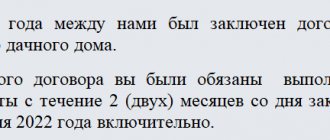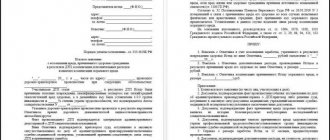Normative base
The law says that warranty periods must be specified in contracts concluded between the parties. The time frame for the validity of such guarantees is specifically stated in Articles 724 and 756 of the Civil Code of the Russian Federation.
Article 724 deals with the customer's rights to make claims if he discovers serious defects within a standard period of time. It also describes at what point the warranty period begins.
According to Article 756, any customer can count on a minimum warranty period of 24 months. During this time after completion of the project, the contractors can legally make claims.
The main regulatory act here becomes the Civil Code. In particular, articles 722 and 755. In addition, provisions of the law dedicated to the protection of consumer rights are often used.
This law allows you to resolve issues related to the reception and presentation of claims. Cases where the customer is an ordinary citizen and the work is performed specifically for his personal needs are examined separately.
Regulatory framework
All construction services (construction of buildings and structures, repairs, reconstruction) are provided on the basis of a concluded contract.
Their legal framework is as follows.
- Civil Code of the Russian Federation (Articles 722, 753, 755-756). This is a fundamental regulatory act that establishes the concept of a work contract and also contains the norms of mandatory guarantees for construction work.
- Decree of the Government of the Russian Federation numbered 812, dated August 14, 1993, on the procedure and main provisions for concluding contract agreements for the construction, repair, reconstruction of facilities for state and Federal needs. This legal act contains mandatory warranty requirements for all construction projects constructed for public needs.
- Resolution of the State Statistics Committee of the Russian Federation number 100 dated November 11, 1999. This legal act regulates the procedure for drawing up documents and claims when identifying deficiencies in the acceptance of construction projects and their operation.
- Federal Law on the Protection of Consumer Rights, which protects individuals as customers of various construction services from individual entrepreneurs and legal entities.
Based on the norms of the Civil Code of the Russian Federation, the contract agreement must be drawn up in writing, indicating the contractor’s warranty obligations.
Warranty period for construction work
The law says that the warranty period for construction work has two limits:
- The minimum is 24 months.
- The maximum is five years.
You can specify a different time in the contract, but the law always sides with the customers. Therefore, the interested party has the right to make claims within the maximum period specified at the legislative level. That is, for five years. In this case, performers can refer to longer guarantees, even lifetime ones.
Warranty periods, therefore, are either specified by law or established by a specific contract. It is also permissible to sign additional agreements on this issue. The guarantee starts from the moment the customer accepts the completed task.
Guarantee period
In legal practice, there are two types of warranty periods for construction work:
- established by the current regulatory Federal acts (Government Decree No. 812 and Article 756 of the Civil Code);
- specified by contractors or customers in agreements for construction work.
Warranty obligations and terms established by Decree of the Government of the Russian Federation number 812 amount to one calendar year (12 months) from the date of acceptance of construction work.
Article 756 of the Civil Code establishes a 5-year warranty period for construction services from the moment they are accepted by the customer.
That is, if defects were identified by the customer during the specified time, the developer company is obliged to eliminate all defects that have arisen at its own expense.
The parties (customer and contractor) may establish additional warranty obligations in an agreement between themselves. But their deadlines should not be less than those prescribed in regulations.
In an example it looks like this. The contractor undertakes to operate the facility and its elements for 10 years. This means that if hidden or other defects are revealed during this period of time, he eliminates the defects at his own expense.
It must be remembered that if the contract specifies a shorter warranty period, then these conditions are illegal, and the customer has the right to demand that defects be eliminated within the time frame established by the Civil Code or Resolution No. 812.
Warranty: what does it cover?
The law states that the guarantee can be extended to literally any building that has not yet been completed. You need to rely on Article 722 of the Civil Code of the Russian Federation.
This applies primarily to:
- Buildings with economic purposes.
- Private houses.
- Apartment buildings.
In addition, roofing and design work may also have their own guarantee. In the case of roofing quality, warranty periods can range from 2-10 years. Here Article 724 becomes the main one. But the parties always have the right to limit themselves to their own time frames. Design work also has a guarantee; it must be at least two years.
The warranty period (warranty period) begins from the date of signing by the parties of the acts, in the KS-2 form, on the delivery and acceptance of the work performed. As a rule, it lasts several years, and it can be extended if such a possibility is provided for in the contract.
It is important to note that if a construction contract has been fulfilled, in terms of performance of work, then under warranty obligations it is considered fulfilled only at the end of their validity period.
The essence of the guarantees is obvious: correction by the Contractor of deficiencies identified during the warranty period.
The warranty performance parameters provide for the Contractor's obligation to correct deficiencies identified during the warranty period. A procedure is provided for identifying these shortcomings, fixing them, justifying that they arose through the fault of the Contractor, for example, due to inadequate quality of work (this could not be identified during acceptance of the work performed), as well as determining the procedure for the parties to eliminate the identified, duly recorded defects and/or defects.
In this case, an examination may be appointed and carried out to confirm, evaluate and justify the identified shortcomings and/or defects; its results (if carried out properly, in compliance with the relevant rules and regulations) are the basis for requiring the Contractor to correct the deficiencies, elimination of defects, that is, the Contractor’s fulfillment of its warranty obligations.
The main disputes between the Contractor and the Customer, within the framework of warranty obligations, arise precisely because it is not clear whether the Contractor is to blame for the identified shortcomings and/or defects.
The Customer’s position is strengthened by the contents of the chapter of the construction contract, which specifies the parameters for fulfilling warranty obligations. Often, this chapter contains provisions that are unacceptable to the Contractor, in particular regarding the fact that (in essence the interpretation of the clauses) the Contractor is obliged to eliminate shortcomings, to correct defects that arose not through the fault of the Contractor, but for other reasons.
Thus, even before signing a construction contract, it is necessary to analyze in detail the chapter on warranty obligations, and by drawing up protocols of disagreements, oblige the other party to exclude or adjust provisions that may lead to a distortion of the essence of the fulfillment of warranty obligations.
If the contract has already been signed, executed, but a “warranty case” has arisen, the Contractor must adhere to certain rules and principles, which will allow the Contractor to reasonably refuse work (elimination of deficiencies and/or correction of defects) that cannot be classified as warranty, since direct the Contractor's fault in the identified shortcomings and/or defects has not been recorded.
First of all, it is necessary to oblige the Customer to justify in writing why the Customer decided that the identified shortcomings and/or defects arose through the fault of the Contractor.
It is also necessary to conduct a joint inspection of the facility, that is, the Contractor must, in writing, invite the Customer to appoint a representative to properly record deficiencies, classify them, to assess the possibility, validity and/or expediency of their elimination, in order, together with the Contractor’s representative, to carry out the necessary measures, with going directly to the site.
It is obvious that the inspection report and identification of defects signed by the parties is the basis for the performance of warranty work.
As a rule, as a result of a joint inspection, those works that the Contractor is not obliged to carry out are excluded from the “warranty work”, because It is not his fault for the identified shortcomings. Moreover, some of the deficiencies allegedly identified earlier are simply not confirmed during a joint examination.
That is, joint inspection is the main principle when working with warranty obligations. Of course, importance must also be attached to the discipline of document flow; response letters to the Customer are required, explanations regarding the inapplicability of warranty obligations for certain works, that is, official documents from the Contractor that substantiate his position.
Efficiency and timely response are also important, because the chapter on the fulfillment of warranty obligations, as a rule, stipulates that if the Contractor does not fulfill its obligations, does not perform “warranty work,” then the Customer has the right to entrust these works to a third party, with the costs associated with the Contractor.
It is also obvious that with a competent and comprehensive approach, the fulfillment of its warranty obligations will eliminate the situation for the Contractor when it is necessary to perform “warranty work” for those defects and/or shortcomings that are not the Contractor’s fault or that do not even relate to the subject of the contract.
Author: Vera Nikulina, lawyer, Perm
Guarantee for construction work from the contractor
The contractor is relieved of responsibility for the quality of the work performed as soon as five years or more have passed since the acceptance of the project. An exception to this situation concerns so-called extended warranty periods. They can be provided for by contract or agreement of the parties. You need to rely on Article 755 of the Civil Code.
Article 723 describes the requirements that can be put forward by customers:
- Elimination of deficiencies free of charge.
- Reducing the cost of work.
- Reimbursement of expenses.
Also, Article 755 of the Civil Code of the Russian Federation states that the contractor must prove his innocence if deficiencies are discovered within a reasonable time. Article 195 of the Civil Code of the Russian Federation should be studied by those who are interested in the concept of the limitation period. This is the time during which a person can protect his rights, for which he draws up a statement of claim and submits it to the competent court. If you have any difficulties, an experienced arbitration lawyer in construction disputes can help.
Special rules on the limitation period are established by Article 725 of the Civil Code of the Russian Federation. This period is equal to one year when it comes to claims for inadequate quality of contract work. In the case of buildings and structures, the limitation period increases to three years.
It is important to pay attention to the points related to the gratuitous elimination of deficiencies. If there is no such clause in the contract, then the judge may decide that the customer has waived the right to warranty repairs. This means that correction of defects is carried out at the expense of the customer. The contract establishes the terms during which the contractors are responsible.
GUARANTEE OF WORK QUALITY IN CONSTRUCTION CONTRACT
Legal aspects of the contract
The norms of current legislation determine responsibility for the quality of work, quality assurance and the timing of detection of inadequate quality during the execution of construction contracts.
The essence of the guarantee is defined in Art. 754 Civil Code. It lies in the fact that the Contractor is responsible to the Customer for the quality of the work performed, as provided for in the technical documentation and construction codes and regulations binding on the parties, as well as the failure to achieve the indicators of the construction project specified in the technical documentation, including such as the production capacity of the enterprise.
In the case of reconstruction of a building or structure, the Contractor is also responsible for the reduction or loss of strength, stability, reliability of the object or part of it.
The quality guarantee is provided by the Contractor:
- for any defects and deficiencies arising due to poor quality work;
— poor design of individual equipment;
— incorrect installation or use of low-quality materials.
A quality guarantee is provided both for the object as a whole and for its individual parts (deteriorating, for example, the appearance of the object, causing the need for premature replacement of individual parts of the object, etc.); not only for significant defects and deficiencies in construction work, but also for minor defects and deficiencies.
Moreover, the Contractor must eliminate all identified defects and shortcomings free of charge and within a reasonable time, and defective parts, materials and mechanisms must be replaced with new ones. Or the Customer may demand from the Contractor a proportionate reduction in the price established for the work or reimbursement of its expenses for eliminating defects, but only on the condition that this right is expressly provided for in the construction contract.
Document fragment. Civil Code of the Russian Federation. Article 723
The contractor, in accordance with the rules on the distribution of risk, is responsible for certain shortcomings in the result of the work, which occurred not only through his fault, but also due to chance.
The customer takes responsibility
In the construction contract, the parties may provide that the Customer assumes not only the consequences of discovering certain defects in the transferred work, but also responsibility for certain defects in the work caused by the Contractor (intentionally or carelessly).
However, the Contractor, whose guilt or inaction is established, will still be liable for the inadequate quality of the work result, and the release from liability in this case will be considered void. But if this entry is in the contract, then the Customer has the obligation to prove the Contractor’s guilt on the basis of clause 4 of Art. 723 of the Civil Code.
Of no small importance is not only the procedure and timing for providing a quality guarantee, but also the timing of detection of hidden defects in constructed objects. According to the provisions of Art. 722 of the Civil Code, the result of the work must comply with the terms of the quality contract during the entire warranty period. In addition, the guarantee of the quality of the work result, unless otherwise provided by the contract, applies to all components of the work result. Although in any case these defects must be detected before the warranty period expires.
Guarantee period
The duration of the warranty period is determined by the parties to the contract, but this period cannot be less than the warranty period determined on the basis of legislation (clause 1 of Article 755 of the Civil Code of the Russian Federation). Thus, the warranty period is equal to 12 months from the date of acceptance of the object (clause 10 of the Decree of the Government of the Russian Federation of August 14, 1993 N 812 “On approval of the main provisions of the procedure for concluding and executing government contracts (contracts) for the construction of facilities for federal state needs in the Russian Federation" ).
But in other cases, other deadlines may be established. The Civil Code has established a deadline for detecting quality defects, which is 5 years (Article 756 of the Civil Code of the Russian Federation). When applying the deadline for guaranteeing the quality of construction work, the legislator uses the concepts “warranty period” and “period for detecting defects in the work result.” The difference between them is clearly stated in Art. 724 of the Civil Code. But in relation to defects discovered after the expiration of the warranty period, but within the five-year period, different rules apply, regarding, in particular, the burden of proof and the calculation of deadlines.
Please note: if in the construction contract the Customer, when informing the Contractor about the shortcomings of the results of the work performed, does not set a deadline for their gratuitous elimination, then the court may regard this as a waiver of this right by the Customer.
The Customer is obliged to notify the Contractor about defects discovered during the warranty period within a reasonable time (clause 4 of Article 755 of the Civil Code of the Russian Federation). A reasonable period is defined as the statute of limitations for claims for defective work performed under a contract and is one year. And due to the inadequate quality of work on buildings and structures, it is determined according to the rules of Art. 196 of the Civil Code, i.e. equal to three years. This norm is enshrined in paragraph 1 of Art. 725 of the Civil Code of the Russian Federation.
Release from liability
In some cases, the Contractor may be released from liability for the quality of construction work performed, but only when he proves that the defects arose due to:
— normal wear and tear of the object and its parts (if the parties to the construction contract are legal entities and (or) persons equivalent to them, one should proceed from the current depreciation standards);
— improper operation of the facility;
— incorrect instructions for operating the facility, developed by the Customer personally or by third parties involved by him;
— improper repair of the object carried out by the Customer personally or by third parties involved by him.
Security deposit
Sometimes to ensure the quality of work, eliminate comments, defects, imperfections, etc. The Customer withholds from payments to the Contractor the so-called guarantee deposit (as a percentage or as a fixed amount in relation to the contract value) upon the occurrence of a guarantee event.
How to document performance deficiencies
The occurrence of a warranty case is inherently a defect. Defects are considered to be products, semi-finished products (assemblies, parts) and work that do not meet established standards or technical specifications in quality, therefore, they cannot be used for their intended purpose or they need to be corrected.
The delivery of work to the Customer by the Contractor is formalized by an act in Form N KS-2 “Acceptance Certificate of Completed Work”. On its basis, a Certificate of the cost of work performed and expenses is drawn up (Form N KS-3). It is intended for payments for work performed (The specified forms are approved by Resolution of the State Statistics Committee of Russia dated November 11, 1999 N 100. This Resolution also determines the procedure for filling them out).
Defects detected during construction work are not reflected in these reports. Here it is necessary to show the entire scope of work performed (implementations). And for the costs of eliminating defects in case of poor-quality construction and installation work, a separate act should be drawn up. There is no unified form for such an act, so an organization can develop it independently and be sure to approve it as an annex to its accounting policies.
Example 1.
Work defect inspection report
Moscow________________________________________________________________________________________________ January 15, 2007
The Customer ZAO Luna, represented by chief engineer Sidorov E.N., and the Contractor LLC Stroitel, represented by site manager Petrov M.F., drew up this Act stating that as a result of the operation of the facility - the Beryozka cafe, agreement No. 092 dated November 14, 2004, commissioning date December 28, 2006,
The customer identified the following faults:
- falling bricks from ledges (the space in front of the building is fenced off with tapes);
— the compressor and the electronic module of the outdoor unit have failed.
Cause:
- poorly fixed brick projections (decorative element of the facade);
— malfunction of the evaporator and condenser of the indoor and outdoor units.
Conclusion:
— replace the brickwork of the facade;
— replace the equipment, because Repairing a McQuay MLC 040CR air conditioner is not cost-effective and is comparable to the cost of a new air conditioner. The detected defect is a warranty case and is subject to correction at the Contractor's expense.
This Act is drawn up in 2 (two) copies, one of which is kept by the Contractor, the second by the Customer.
Contractor's representative:____________________ Customer's representative:
———— M.F. Petrov______________________________———— E.N. Sidorov
(Signature)_______________________________________________(Signature)
Stamp of TECHNO SERVICE LLC _______________ Stamp of NOVAK CJSC
A calculation of the costs of correcting the defect is prepared for the marriage certificate. The customer has the right to exercise control over the quality of materials used and semi-finished products when reworking work due to detected defects. Based on the defect inspection report and the calculation of the costs of correcting the defect, the final losses from defects are determined, which are calculated using the formula: PB = ZT - BP + MR, where PB is losses from defects; ZT - costs of correcting defects; VR - the amount of reimbursed expenses by the guilty parties; MR - material resources capitalized after disassembling structural elements. Since defects in construction arise, among other things, in the case of delivery to the Contractor of low-quality materials and semi-finished products, then, in addition to the certificate, the Customer also provides the Contractor with a letter of claim. The form of the claim letter is also not approved by current legislation, so it should be developed independently and approved as an annex to the accounting policy (see example 2). We recommend that in the claim letter you indicate: - the number and date of the construction contract under which the claim is being made; — the subject of the Customer’s claim and demand; — violations of contractual obligations committed by the Contractor and evidence of his guilt with reference to the provisions of the construction contract concluded between the parties, as well as with reference to the norms of law that the Contractor violated; — the amount of the claim and its reasonable calculation; - a list of original documents attached to the claim, or duly certified copies, or extracts from them and other information and evidence necessary for the Contractor to satisfy the claim. The Contractor, in turn, issues a letter of claim to its Supplier for the supplied low-quality materials and semi-finished products (see example 3). The customer must make a claim in writing. If he does not do this, the Supplier may refuse to consider it to the Customer. The Contractor is obliged to consider the claim and inform the Customer about the results of its consideration also in writing within one month from the date of receipt, unless a different period is established by the construction contract or the norms of current legislation. If the Contractor requests additional documents in addition to those attached to the claim, the Customer is obliged to provide them.
Example 2. To the management of Air Conditioning LLC, Moscow, st. Tretyakovskaya, 20/1 r/s 40702810100000005354 in the Tver Branch of Sberbank of Russia OJSC Moscow, c/s 30101810400000000225 BIC 044525225 Stroitel LLC, Moscow, st. Nelidovskaya, 10 r/s 40702810100000000435 in the Tver Branch of Sberbank of Russia OJSC Moscow, k/s 30101810400000000225 BIC 044525225 Claim Moscow January 16, 2007 Air Conditioning LLC under contract No. 092 dated 12.12.2005 manufactured in 2006 for Stroitel LLC air conditioner McQuay MLC 040CR, serial number A759-m, the latter was installed in the premises of the Beryozka cafe on 08/01/2006, the date of commissioning was 12/29/2006. The cost of the air conditioner is 38,000 (Thirty-eight thousand) rubles. 00 kopecks, incl. VAT 18% - 5796.61 (Five thousand seven hundred ninety-six rubles 61 kopecks). The air conditioner worked for less than two weeks from the moment it was put into operation. On January 10, 2007, a defect was discovered. The product “Air Conditioner McQuay MLC 040CR” failed through no fault of the owner, which is confirmed by the Defect Report dated January 15, 2007, a copy of which is attached. Taking into account that:
a) the McQuay MLC 040CR air conditioner failed during the warranty period; b) operation of the McQuay MLC air conditioner from the moment of commissioning until the moment of failure was carried out in full accordance with the operating instructions;
c) repair of the McQuay MLC 040CR air conditioner is not cost-effective and is commensurate with the cost of a new air conditioner, we ask you to replace the equipment at the expense of Air Conditioning LLC no later than January 30, 2007 (If the defect is corrected by Stroitel LLC, the following should be written in this paragraph: “Order to transfer no later than “__” _________ 20__ LLC “Stroitel” to the bank account N (bank details) _______ rubles to reimburse the costs of eliminating the defect.”) If measures are not taken to eliminate the defect <2> the case will be referred to arbitration Moscow court for compulsory collection with attribution of costs of conducting the case at the expense of the supplier. Grounds - clause 2 of Art. 475 of the Civil Code of the Russian Federation. ——————————— <2> And if the defect is eliminated by the buyer, it should be written: “and failure to receive funds by the specified date.”
Application:
1. Defect report.
2. Copy of invoice No. 1234 dated July 31, 2006, received from Air Conditioning LLC.
3. Copy of invoice No. 1234 dated July 31, 2006, received from Air Conditioning LLC. General Director signature A.K. Zaripov Chief accountant signature N.N. Kirov
S.A. Owl, 2014
Is it possible to waive the warranty on construction work?
Contractors are required to carry out their work in connection with the information provided in the technical documentation. And the terms specified in the initial agreement must be strictly observed.
The contractor must provide a guarantee regarding the high-quality execution of the order, as well as the possibility of safe operation of the facility, regardless of its purpose and other features.
The contractors are obliged to correct defects at their own expense if they were discovered after completion of all work, but before the expiration of the maximum period. The main thing is for the customer to prove and show why certain problems arose. And who was to blame for the fact that the shortcomings appeared in the first place? The requirement is established by paragraphs 4, 5 of Article 724 of the Civil Code of the Russian Federation, as well as Article 756 of the Civil Code of the Russian Federation.
There may be only a few situations in which contractors are relieved of their duties altogether.
In these cases, they do not restore the damage at their own expense:
- When the warranty period established by the contract has ended. Or the maximum five-year period specified by applicable law.
- If the defects are associated with normal wear and tear of buildings. Or with the fact that certain parts of the object were subjected to this effect.
- In case of improper operation of the building or failure to comply with standard rules.
- If repairs or other work carried out by the customer himself were performed poorly.
A written complaint from the customer is relevant only if it is proven that the culprit of the incident was the contractor. The grounds for disclaimer of liability are listed in paragraph 2 of Article 755 of the Civil Code of the Russian Federation.
Customers cannot refuse the guarantee. Even if it is not specified in the contract, a standard maximum period of time equal to five years is introduced. This is where Federal Law No. 214 comes to the rescue.
Procedure for detecting defects after acceptance of work
The contractor is obliged to carry out construction work in accordance with the technical documentation approved by the customer within the time limits specified in the contract. At the same time, the contractor guarantees high-quality execution of the order and the possibility of safe operation of the constructed facility.
If defects in the building were discovered after the end of the warranty provided for by the agreement of the parties, but within the five-year period established by Article 756 of the Civil Code of the Russian Federation, the contractor is obliged to correct the identified defects at his own expense.
In this case, it is necessary to prove for what reasons the shortcomings arose and who is responsible for their occurrence.
Warranty and non-warranty cases
Article 741 of the Civil Code of the Russian Federation proves that all cases described in a specific agreement or in legislation are guaranteed.
In addition, there are the following nuances:
- The contractor is relieved of liability if the operation is improper.
- If a defect is discovered, the construction commission may mistake it for natural wear and tear.
- The contractor himself may disagree with the opinion of the other party and make claims.
Guarantee for design work
01.07.2008, 15:58 Guarantee period
In my opinion, you have confused and confused everything: - Statutes of limitation are established by the criminal code and for the designer, in fact, are lifelong because their countdown begins from the moment of the accident; — There are no concepts of “warranty period” and “claim period” in the civil code of the Russian Federation. There is a statute of limitations. During this period, claims may be filed in court. Article 200.
Beginning of the limitation period 1. The limitation period begins from the day when the person learned or should have learned about the violation of his right. Exceptions from this rule are established by this Code and other laws.
Installed. It is equal to the lifetime of the object built according to this project.
| #2 |
| Question 3 – the architect actually told me that from the moment the expert’s conclusion is approved by the supervisory authority, we don’t have to fix anything for free. Is it so? |
Article 761. Contractor’s liability for improper performance of design and survey work
1. The contractor under a contract for design and survey work is responsible for the improper preparation of technical documentation and survey work, including deficiencies subsequently discovered during construction, as well as during the operation of the facility created on the basis of technical documentation and survey data. 2. If deficiencies are discovered in the technical documentation or in the survey work, the contractor, at the request of the customer, is obliged to redo the technical documentation free of charge and, accordingly, carry out the necessary additional survey work, as well as compensate the customer for losses caused, unless otherwise established by law or the contract for the performance of design and survey work .
(Article 761, “Civil Code of the Russian Federation (Part Two)” dated January 26, 1996 N 14-FZ (as amended on February 7, 2011))
Here is the text of the clause of the agreement “If the Customer discovers at any time before, during or after acceptance of the Services during the warranty period for the material result of the Services, and in cases provided for by law, after the expiration of the warranty period, deviations from the terms of this Agreement or the requirements of applicable law or if any deficiencies in the Services are identified (including the documentation, materials, equipment used), regardless of whether these are obvious deficiencies, obvious or hidden, the Customer calls a representative of the Contractor to draw up a report on the deficiencies in the form approved by the Parties in Appendix No. 1 to this Agreement (hereinafter referred to as the “Defects Statement”). If the Contractor's representative fails to arrive within the time period specified by the Customer, the latter has the right to draw up a Report on Deficiencies unilaterally. Such a Statement of Deficiencies, which records all detected discrepancies and shortcomings, will have full legal force and be binding on the Parties.”
Those. Now we can change the contract for the rest of our lives
The legislation has changed - please.
No, that's wrong. Establishing a causal relationship between improper performance of design and survey work and deficiencies discovered during construction, as well as operation of an object created on the basis of technical documentation and survey data, is possible only by a court. And then only after seeking the opinion of knowledgeable persons and conducting a forensic construction and technical examination.
How can a customer immediately, right away, determine by eye that problems in his warehouse are caused by an error in the conservation project?
Developer's responsibility
The standard scope of warranty obligations is prescribed by Article 7 of Federal Law No. 214. This is where the right to extend deadlines is described if the parties agree.
An important requirement is full compliance of the object with the conditions specified in the agreement. A single guarantee of at least three years applies to windows and doors and other similar objects.
The rule does not apply only if residents independently replace any elements. All elements and equipment are transferred when the delivery certificate is issued. All rules are described in Federal Law No. 214.
What is not covered by the developer's home warranty?
Since the developer is responsible exclusively for “capital” defects, that is, those arising through his fault as a result of design or construction defects, a refusal to guarantee the elimination of defects is always associated with the following circumstances:
- natural wear and tear of equipment, components, elements due to the end of the design service life;
- violation of the rules of operation of equipment, networks, nodes and elements (provided that the requirements of clause 1.1, part 1, article 7 of Federal Law No. 214 of 2004 are met);
- violation of the requirements of technical and other regulations and standards when connecting and operating heating, plumbing, electrical, gas and other equipment;
- emergency situations in heating systems, water supply and sanitation, ventilation, gas and electrical networks, provoked by third parties, management companies, residents, the elements, etc.;
- damage and other defects associated with the actions of residents, management companies, and third parties.
If the identified defect is not related to any of the above, the shareholder has the right to demand that the developer eliminate the defect free of charge and compensate for the costs associated with its occurrence. But this must be done within the warranty period.
Construction guarantee depending on the type of work
Typically, specific deadlines in this area depend on how complex the work is in a particular case. A lot of attention is also paid to operational characteristics.
But the minimum period established by law of 24 months cannot be reduced. The customer can apply for the elimination of defects within five years if the following circumstances are present, as evidenced by Article 741 of the Civil Code of the Russian Federation:
- Repairs have been carried out.
- The agreement was not concluded.
- In words, contractors only guarantee one year of excellent service.
The main thing is that the detected flaw is clearly of a production nature. We have already written above when the performer has the right to refuse to correct the situation only at his own expense.
Often, to determine the specifics of a particular case, an independent examination is required. The customer usually pays for this procedure.
If during the examination, quality defects in construction or repairs are identified, then there is a high probability that the responsibility for eliminating the problems will be assigned to the contractor.
If there was damage, then there is a right to demand compensation for it. Then contractors pay for the services of experts.
Nuances
Then many have to go to court after the claim is filed. All issues are resolved with the construction company, if it has not completely disappeared from the market.
It's worth getting around other apartment owners. Perhaps many of them have faced this marriage problem. Individual claims are collected from all owners, and then a so-called collective document is drawn up.
You can transfer documents in person, but it is permissible to use the services of a housing association. If no response is received within a month, then you can proceed to legal proceedings.
Do not forget about examinations from independent employees. This procedure greatly simplifies the resolution of any issues. And it reduces the time it takes to make decisions. The court accepts documents as evidence faster.
If you find an error, please select a piece of text and press Ctrl+Enter.
The article Warranty obligations in construction was modified: March 2, 2020 by Nemtsev D.S.
3 886
Similar
What obligations does the contractor provide regarding the warranty?
A standard document is drawn up between the contractor and the client - a contract agreement for the performance of a certain type of work.
The contractor is obliged to comply with all deadlines specified in the contract and deliver the finished project on time. Make sure that the transferred construction project complies with all the terms of the contract, accept the work and pay according to the contract.
If you have any complaints about the quality of work or delivery deadlines, you must express your complaints to the contractor and reconsider the terms of the agreement.
The guarantee allows you to resolve any issues that arise after the delivery of the construction project by the contractor. The contractor is obliged to compensate for losses, redo poor-quality work or eliminate defects within the agreed time frame.
The warranty covers:
- For shortcomings or defects that arose due to the fault of the contractor;
- For poorly performed work or parts of structures;
- The use of low-quality materials or improper installation of equipment.
Warranty obligations apply not only to the entire property, but also to individual parts that need reconstruction or replacement due to poor quality or contractor errors. The warranty applies not only to the identification and elimination of significant defects, but also to minor defects.
The contractor is obliged to eliminate the defects that have arisen at his own expense within the time period agreed with the customer. If it is necessary to change any parts of the premises, equipment or parts, the contractor must replace such parts with new ones.
You can refuse to replace defective parts or eliminate defects by demanding compensation for damage incurred. But this point must be discussed in the drawn up contract for the provision of services.
If a deficiency or defect was not directly the fault of the contractor, but was caused by random factors, then he is still responsible for eliminating such defects at his own expense.
Please read the construction contract carefully before signing it. The contractor may include in the contract a clause according to which the customer, and not he, is responsible for certain shortcomings and defects identified after the delivery of the project, even if the customer is not to blame for the defect.
But do not despair, even if this moment was missed, it is possible to prove the contractor’s guilt and oblige him to eliminate the defect in accordance with legal norms.
The only thing is that for this you will need to independently prove the contractor’s guilt, and if guilt is established, then this clause of the contract will be canceled and the contractor will be obliged to carry out repairs at his own expense.
The completed construction project must meet established quality standards throughout the entire warranty period for the building and its components.
If an obvious or hidden defect is detected, you must immediately contact the contractor and point out to him the detected problem.
But do not forget that such a right is valid only during the warranty period; after the expiration of the warranty period, it is no longer possible to contact a contractor to eliminate the defect, and repairs will have to be carried out at your own expense.







